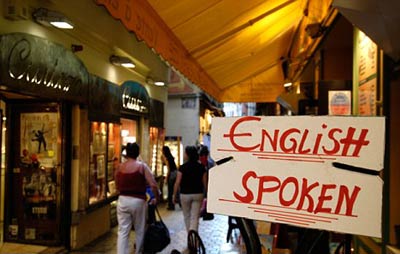|
 Tongue tied: 64 percent of Britons polled admitted they did not know a single word in any language other than English. |
|
Two-thirds of Britons cannot say anything in a foreign language – with one fifth even unsure of what ‘bonjour’ means, a study claims. The findings appear to confirm the cliche about Britons being notoriously bad at making an effort to speak the lingo when abroad. Overall, 64 percent of those polled admitted they did not know a single word in any language other than English. And just one third – 34 percent – said they were willing to make an attempt at speaking a foreign language while on holiday. One fifth (19 percent) did not know the meaning of the French word for hello, one of the most recognisable foreign greetings in the world. And 63 percent had no idea what the Dutch word ‘goedemorgen’ meant, despite the obvious similarities to our own ‘good morning’. Young Britons were found to be worst at making the effort, with nearly half – 47 percent – of those aged 16 to 24 admitting they have never spoken the foreign language they learned at school. But 45 percent of the over-55s said they liked to try to speak the local language when abroad, the poll of 2,000 adults by travel website Hotels.com found. It is compulsory for all pupils to study a foreign language up to the age of 14 and French, German and Spanish are all on the national curriculum. Yet only one in ten of those polled considered themselves able to speak one of them. Of these, a quarter could ask only ‘everyday questions’, 21 percent said they were limited to ‘hello’ and ‘goodbye’, and one in 50 claimed they could understand everything said to them in another language, but were unable to reply. Reasons for not trying to speak a local language included not being bothered, fear of making a mistake or expecting hosts to be able to speak English. (Read by Emily Cheng. Emily Cheng is a journalist at the China Daily Website.) (Agencies) |
一项研究称,三分之二的英国人不会说任何外语,五分之一的英国人甚至连bonjour是什么意思都不清楚。 这一研究发现似乎证实了关于英国人的一个成见,就是英国人在国外很少会努力去说当地的语言,这一点简直都出了名。 总体来看,有64%的被调查者承认,除了英语之外,任何一门其他语言他们都是一个字也不认识。 只有三分之一(34%)的英国人说他们愿意在出国度假时尝试着去说一门外语。 五分之一(19%)的英国人不知道hello在法语中的对应词的意思,而这是世界上识别度最高的外语问候语之一。 63%的英国人不知道荷兰语goedemorgen是什么意思,尽管这个词和英语中的good morning(早上好)有着明显的相似性。 据调查发现,英国年轻人在努力说外语这方面做得最差,年龄在16到24岁之间的英国年轻人中有将近半数(47%)承认自己从未开口说过在学校里学过的外语。 旅游网站Hotels.com 开展的这一涵盖了2000名成人的调查发现,55岁以上的英国人中有45%说自己在国外时愿意尝试着去讲当地的语言。 在英国,所有的学生在满14岁后都必须学习一门外语,法语、德语和西班牙语都在英国教学大纲上。 然而,只有十分之一的被调查者自认会说这三门外语中的一种。 在这部分人中,四分之一的人只会问“日常问题”,21%的人说他们的外语程度仅限于说“你好”和“再见”,五十分之一的人称自己能完全听懂一门外语,但不会用外语作答。 不愿尝试去说当地语言的原因包括不想麻烦、害怕犯错,或指望当地人会说英语。 相关阅读 (中国日报英语点津 陈丹妮 编辑:Julie) |
|
Vocabulary: bonjour: <法语> 你好 cliche: 固有的不一定正确的观点,偏见;陈词滥调 notoriously: 臭名昭著地,声名狼藉地,出了名地 lingo: 方言 |
